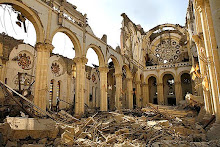2
Kings 4, 42-44;
Psalm 145;
Ephesians 4, 1-6;
St. John 6, 1-15
Brothers and Sisters in Christ,
"How are we to buy bread, so that these people may eat?" (John 6, 5) Test question.
There is a bread which cannot be bought and which all must eat to live: "I am the Bread of Life." (John 6, 35) Christ himself is the food for which man has always yearned. Christ is the Life for which the man seeks who knows he must die. "The bread that I shall give for the life of the world is my flesh." (John 6, 51)
From the beginning of time man has sought in vain, through what he finds in himself or in other creatures, to satisfy his yearning for life, an abundant life beyond death. Only in Christ can man attain at last that perfect communion with his Creator that bridges the chasm of death which has separated the two since the first sin of Adam and Eve. And yet, even after Christ has taught that it is by forgiveness of sins that we are fed with God's life and are saved from unhappiness, there yet remain the multitudes who see in God only someone to relieve their earthly longings, their temporary misfortunes in this life. They fail to see beyond the signs, the healings and the multiplication of loaves and fishes, to the reality of the eternal God by whose power these things are done.
“By freeing some individuals from the earthly evils of hunger, injustice, illness, and death, (Cf. John 6: 5-15; Luke 19:8; Matthew 11:5) Jesus performed messianic signs. Nevertheless he did not come to abolish all evils here below, (Cf. Luke 12:13-14; John 18:36) but to free men from the gravest slavery, sin, which thwarts them in their vocation as God's sons and causes all forms of human bondage. (Cf. John 8:34-36)” (CCC 549)
All are called to no less than total and eternal communion with God himself forever. This promise begins now in an anticipation of glory by receiving the Eucharist, the Body and Blood of Christ, the Living Bread. Our relationship with the Lord will fall short, and our happiness will remain incomplete, as long as we fail to go from the signs to the reality they signify. The Eucharist is the only perfect "sign" on earth of God for, not only is his passion and death re-presented, he is really and truly present and we do indeed receive him whole and entire in the sacred host.
To possess the life of God we must receive him as he is and not as we would have him be. The sign of the Eucharist, wherein God is so often missed and overlooked, perfectly communicates this truth because it is the very Presence of God Himself. The living God always eludes those who grasp for him as an earthly Messiah only. The Gospel relates that it was from these mistaken ones that Jesus fled: "Perceiving then that they were about to come and take him by force to make him king, Jesus withdrew again to the hills by himself." (John 6, 15)
If we would dwell forever in God then He, truly present in the Eucharist, must dwell within us. In the Mass and in other moments of adoration we learn to see Christ present here on earth, enjoying a communion with him in order to go "beyond the veil" of this world with its hunger and thirst, war and injustice, disease and death, to dwell with him eternally in the heavenly "communion" of perfect love and light and life.
(See also paragraphs 439, 549, 559 in the Catechism of the Catholic Church.)
I look forward to meeting you here again next week as, together, we "meet Christ in the Liturgy", Fr Cusick
Meeting Christ in the Liturgy (Publish with permission.)
 "A prophet is not without honor except in his native place and in his own house."
"A prophet is not without honor except in his native place and in his own house."






















